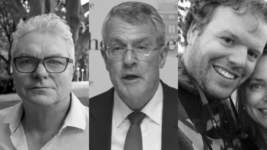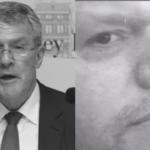Whistleblowers Are Still the Enemy: McBride to Appeal as Boyle Continues to Stew

Former Australian Defence Force lawyer David McBride was granted permission to appeal the severity of the sentence he’s been serving since May, which was handed down in regard to his having blown the whistle to the press in respect of multiple Australian special forces war crimes perpetrated in Afghanistan, in an attempt to call out the Australian Army on the way it was managing operations in the foreign nation.
The sentence ACT Supreme Court Justice David Mossop imposed upon the high-profile whistleblower was considered to be excessive by many of his supporters, as McBride was handed a head sentence of 5 years and 8 months prison time, with non-parole set at 27 months, which is when the lawyer is currently able to apply for conditional release.
But the fact that the lawyer who spoke out about government corruption is now stuck in prison flies in the face of the manner in which federal Labor and current attorney general Mark Dreyfus approached the last election with promises to save whistleblowers from being pursued by government, which is a deceit the chief lawmaker is continuing to peddle.
And McBride’s 68-month sentence is not the only sign that the AG’s quest for whistleblower protections doesn’t actually involve public service officers who speak out in the public interest being saved from spending time in gaol due to their leaks, as the prosecution against Australian Taxation Office discloser Richard Boyle continues, despite a court ruling he was right to go to the press.
Crucifying the whistleblower
The courtroom erupted in applause when McBride entered on Wednesday, the ABC reports. David, then a military lawyer, initially raised complaints internally regarding the pursuit of ADF officers in a theatre of war that was left to run riot. And in his having disclosed classified documents to the ABC, journalists went on to produce the 2017 Afghan Files report, which exposed multiple war crimes.
The grave anomaly in the pursuit of McBride is that war crime whispers weren’t confined to him and the 2016-government commissioned Afghan Inquiry, which released the Brereton report in November 2020, identified 39 killings relating to 23 Australian special forces incidents and 19 individuals over 2012 and 2013, that warrant investigation as potential war crimes.
The stark injustice apparent in regard to Afghan war crimes is that, despite the establishment of an agency to inquire into the cases, the Office of the Special Investigator, McBride is the only person serving time in relation to these crimes. And while the OSI did lay charges against former SAS officer Oliver Shultz last year, in mid-2024, his war crime trial had been delayed due to new evidence.
And a group of independent UN experts called on the Australian government on Monday, to “immediately fulfil its commitment to compensate the families of 39 murdered victims of war crimes committed by the Australian military in Afghanistan”.
So, while McBride has been granted the right to appeal his sentence on the basis that it was his duty to disclose, he was initially blocked from arguing his defence, under the Public Interest Disclosure Act 2013 (Cth), as the prosecution raised an order suppressing his evidence, which was again done during his November 2023 trial, and this led him to plead guilty to three criminal offences.
Protecting his own
Dreyfus was at the Sydney Institute last month, outlining to those gathered for a forum on transparency in politics that “improved whistleblower protection has long been an interest of” his, and he went on to explain that one of his “proudest achievements” during his first stint as attorney general in 2013, was the enactment of the Public Interest Disclosure Act (the PID Act).
This legislation is supposed to promote public service employees in coming forth and blowing the whistle and it is supposed to provide them the protections needed to fulfil this role, which ultimately combats corruption in government. However, Dreyfus’ whistleblowing laws couldn’t be exercised by McBride and when they were, for the first time, applied by Boyle, a glaring anomaly in law failed him.
The Morrison government greenlighted a hitlist of three whistleblower prosecutions in 2018, and, as the constituency rallied against the injustice of seeking to punish the messenger, Dreyfus then publicly promised in opposition in October 2021, to overhaul the dodgy laws in the PID Act, which he’d drafted, if re-elected. But the major redrafting of these laws is yet to happen two years on.
Protected and pursued
Dreyfus took office in mid-2022, and he went on to drop a fourth prosecution that the Coalition had launched against barrister Bernard Collaery in 2018. Collaery wasn’t technically a public service whistleblower, as it was his client, Witness K, who was disclosing. And K went to trial prior to Labor retaking office, and the prosecution against the lawyer was dropped by the AG in July 2022.
The Alliance Against Political Prosecutions then wrote to Dreyfus, asking why he didn’t apply the power he has, under section 71 of the Judiciary Act 1903 (Cth), to end the pursuit of Boyle and McBride, and he replied that the capacity he has to end any Commonwealth prosecution wasn’t applied to their cases, as he can only exercise it in “very unusual and exceptional circumstances”.
But an aspect relating to the case of Richard Boyle is obviously an instance of “very unusual and exceptional circumstances”, as the South Australian Supreme Court found on appeal in June, that Boyle was protected in disclosing ATO wrongdoing to the ABC in early 2018,yet the 24 criminal charges against his name, which relate to preparatory evidence gathering acts, still hold.
So, the court found that in telling the press about an unlawfully applied garnishee procedure he was protected from criminal prosecution, under an immunity provided in section 10 of the PID Act. However, this immunity from criminal prosecution was not found to apply to the preparatory acts Boyle undertook in building his case.
This finding appears to be in line with a 2023 consultation paper regarding the major PID Act overhaul, as it considers whether criminal immunity should apply to preparatory acts. So, the AG’s office is well aware that Boyle is being prosecuted over acts taken in preparing his PID disclosure, as it’s also contemplating whether to enact laws to protect people against this in the future.
Boyle was not only vindicated by the SA Supreme Court in having blown the whistle, but the ATO practice he spoke out against was ended as a result of his having sung to the press and several subsequent inquiries have found that the garnishee practice was being applied in a way that breached protocol.
Indeed, many of Boyle’s supporters in the community consider the legal bind that the ex-ATO officer finds himself in now does meet the threshold of “very unusual and exceptional circumstances” and that in turn, Dreyfus should drop the case.
The High Court is currently deliberating upon whether to grant Boyle special leave to appeal the finding of the Supreme Court in regard to its criminal immunity ruling, and, as that court is considering this, the whistleblower’s criminal trial has been delayed to sometime next year.







